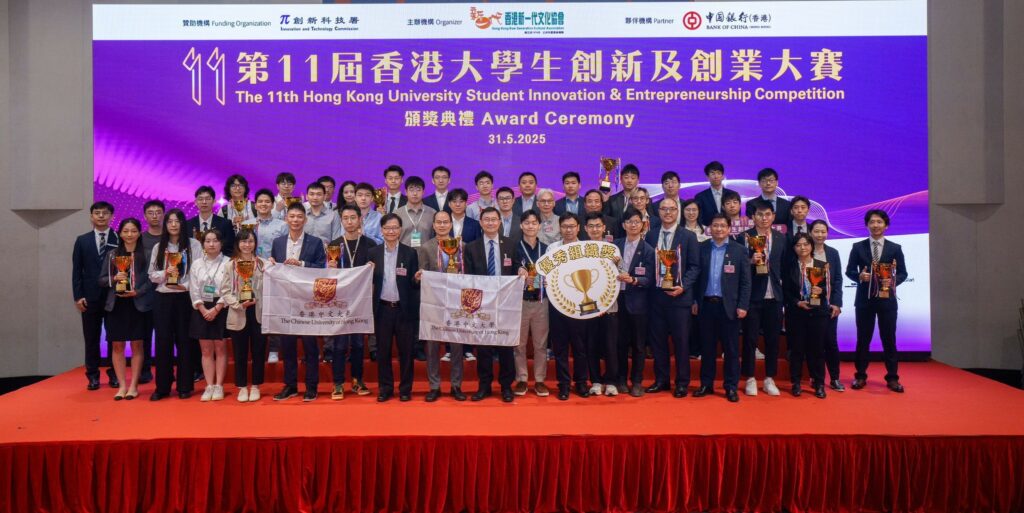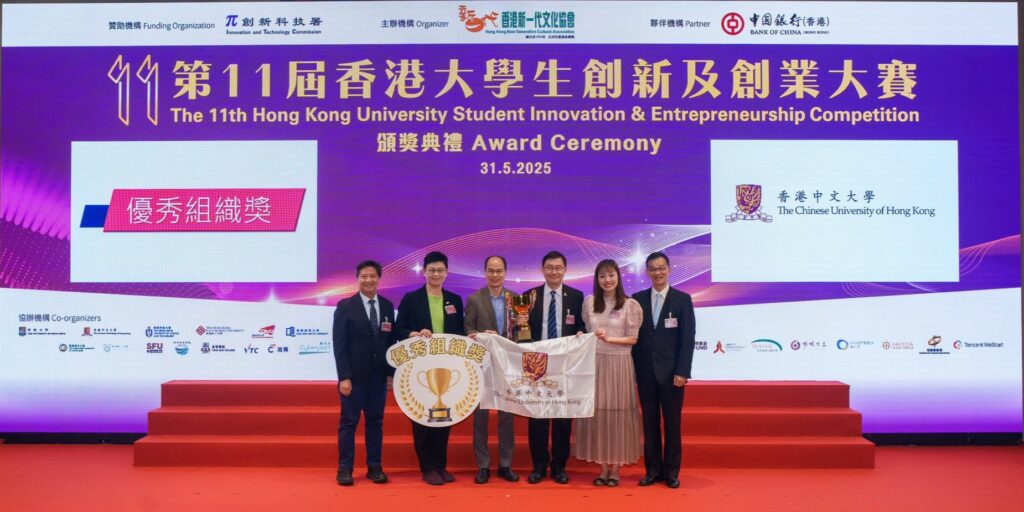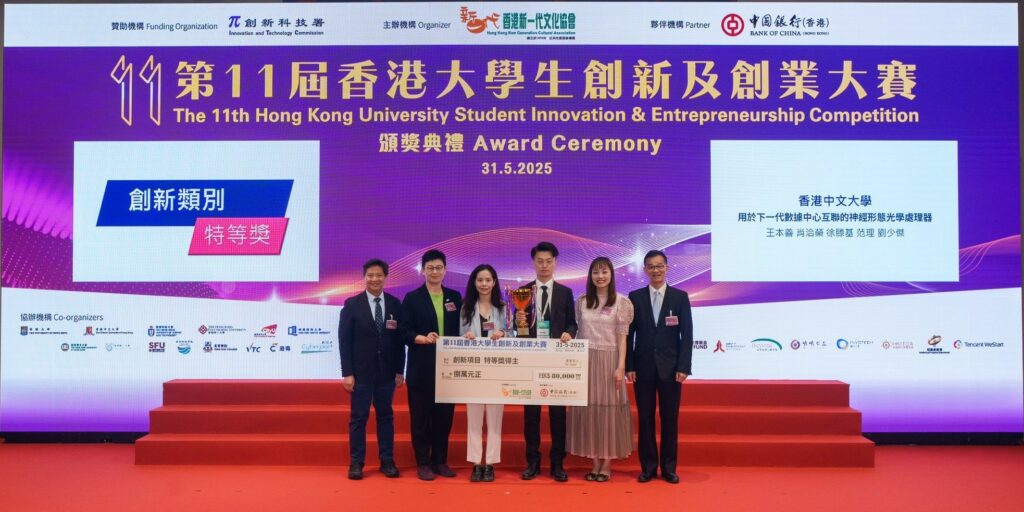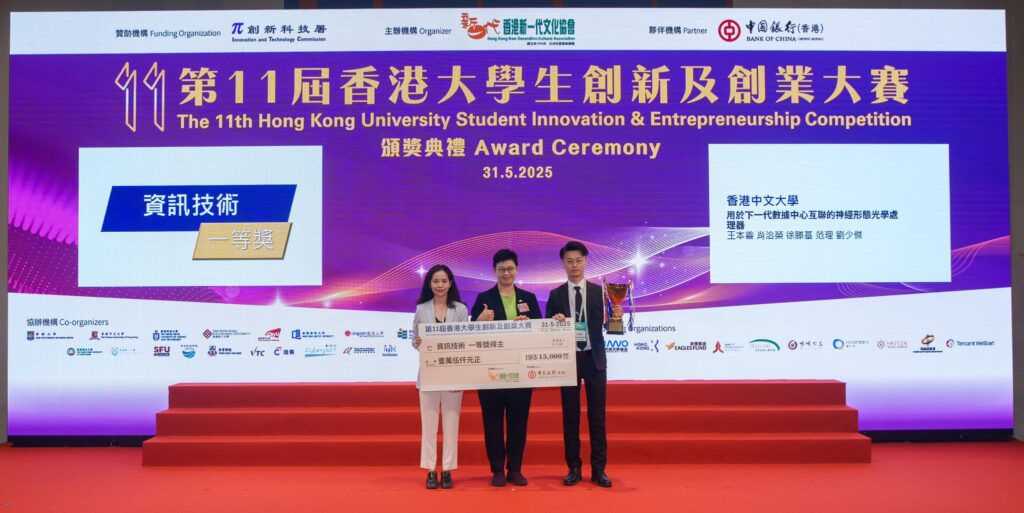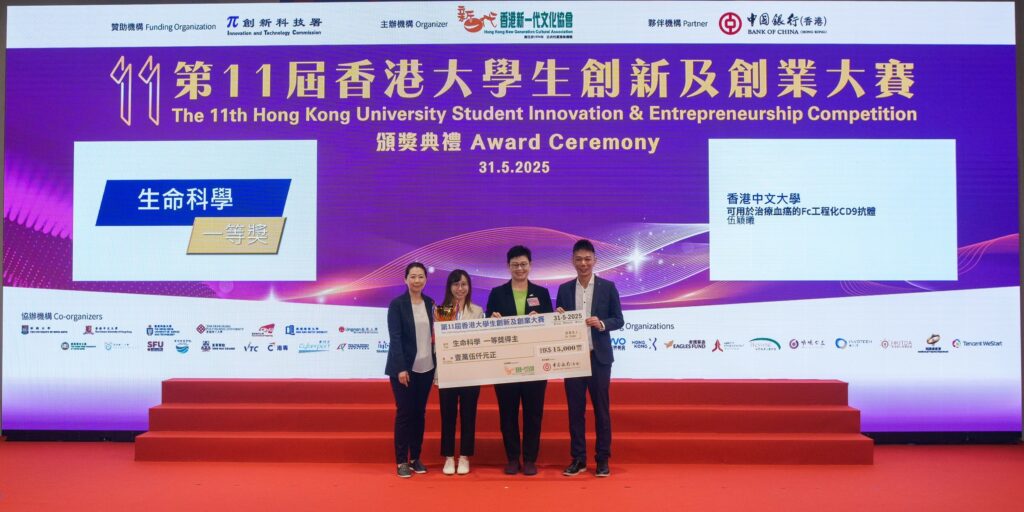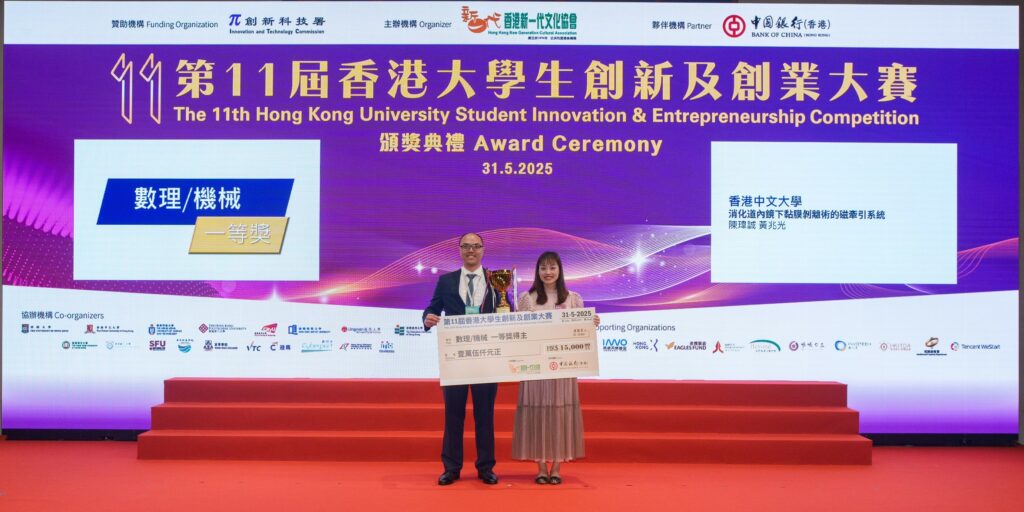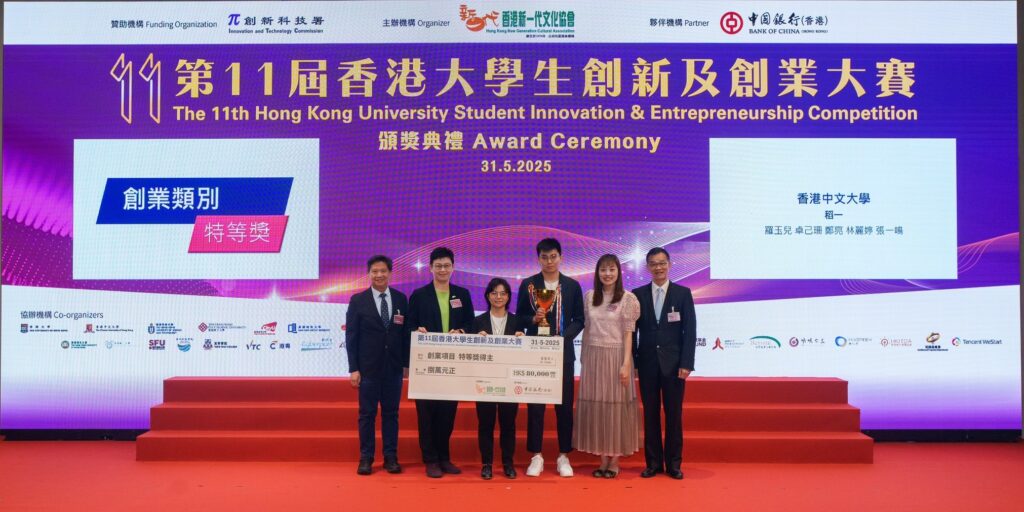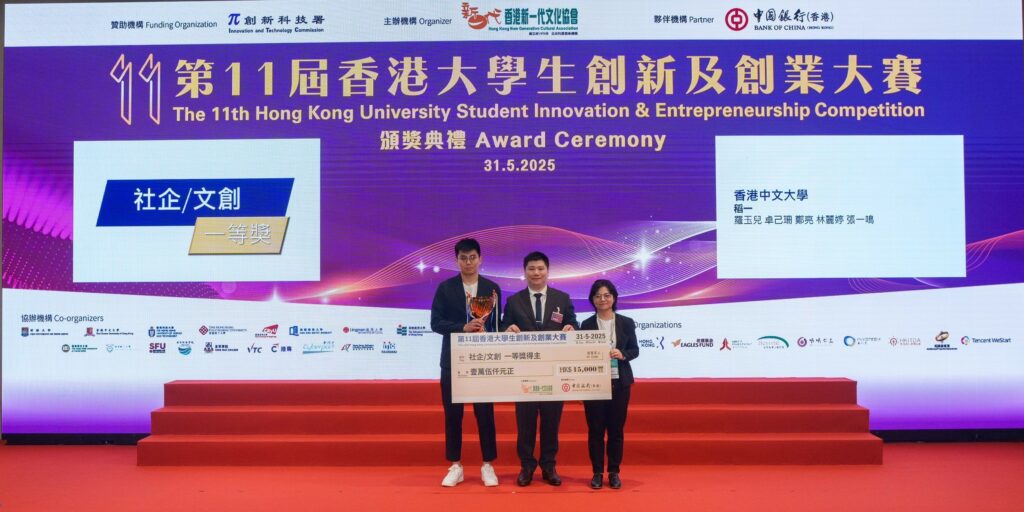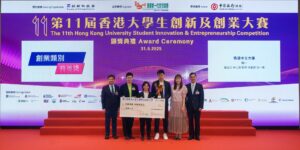CUHK
News Centre
CUHK students win most awards at the 11th Hong Kong University Student Innovation and Entrepreneurship Competition
Students from the Chinese University of Hong Kong (CUHK) achieved outstanding results at the “11th Hong Kong University Student Innovation and Entrepreneurship Competition”, winning 22 awards—the highest among all Hong Kong universities. The awards include: the grand prize, three first prizes, five second prizes, five third prizes and one merit prize in the innovation category, and the grand prize, one first prize, two second prizes, one third prize and one merit prize in the entrepreneurship category. In addition, CUHK also won the Outstanding Organisation Award for its outstanding achievements.
Director of CUHK’s Office of Research and Knowledge Transfer Services Professor Benny Zee said: “As a leading comprehensive research university in Asia, CUHK is dedicated to nurturing exceptional talent with innovative thinking, making significant contributions to Hong Kong and the nation. This competition provided an ideal platform for CUHK students to showcase their creativity and entrepreneurial potential, with the practical experience gained helping them progress further on their innovation journey. We are proud of our students’ outstanding achievements and look forward to their continued success in the future.”
Innovation grand prize and first prize (Information Technology): Next Generation Data Centre Interconnects with Integrated Neuromorphic Photonic Processor
Large-scale artificial intelligence (AI) training requires uniformly ultra-low latency and energy-efficient data interconnects to let massive graphics processing units (GPUs) function as a unified system. However, current technologies often struggle with delays and high energy use, limiting AI development. Under the supervision of Professor Huang Chaoran from the Department of Electronic Engineering, a project team comprising Wang Benshan, Xiao Qiarong, Xu Tengji, Fan Li and Liu Shaojie presented a new type of data connection that uses light instead of electricity to transmit information. This system is the first in the world to operate entirely with light, eliminating the need for traditional electronic parts that usually slow things down. Their invention is over 10,000 times faster and uses 1,000 times less energy than current methods. It can also send data over much longer distances—up to 80 km—compared to just 2 km with existing technology. This means it could connect millions of GPUs with near-zero latency, which reducing hardware costs and energy consumption, providing comprehensive and robust support for future AI development.
Innovation first prize (Life Sciences): Fc-engineered CD9 Antibodies for Blood Cancers
Although current CD19/CD22-based immunotherapies have significantly improved treatment outcomes for acute lymphoblastic leukemia (ALL), only one-third of patients eventually achieve durable remission. PhD student Ng Wing-hei, under the supervision of Professor Leung Kam-tong from the Department of Paediatrics, developed CD9 antibodies that exhibit markedly reduced platelet toxicity while preserving exceptional anti-leukemia activities against highly resistant ALL. The development breaks the decade-long bottleneck for CD9-targeted therapy and advances the development of first-in-class CD9 biologics for leukemia patients who are currently deemed incurable. The team is currently preparing to establish a startup company to further advance its development, bringing new hope to patients with terminal blood cancers.
Innovation first prize (Mathematics and Physics/Mechanics and Control Systems): Magnetic Countertraction System for Endoscopic Submucosal Dissection in Gastrointestinal Tract
Endoscopic submucosal dissection (ESD) is an advanced endoscopic surgery used for the non-invasive treatment of early gastrointestinal cancers. In the current approach, surgeons use a single instrument through an endoscope to perform tissue dissection. The instrument moves along with the endoscope’s view, resulting in technical complications and a long learning curve. Under the supervision of Professor Li Zheng from the Department of Surgery at CUHK , Chan Wai-shing and Duncan Alexander Wong have proposed a novel endoscopic magnetic countertraction system and method that can achieve dynamic tissue traction within the gastrointestinal tract. Compared to conventional ESD, this system enables more flexible manipulation during ESD procedures, reducing surgical difficulty, shortening the time it takes and enhancing safety.
Entrepreneurship grand prize and first prize (Social Enterprise/Cultural & Creative Services): RiceFort
Law Yuk-yi from the Faculty of Business Administration and Cheung Yat-ming from the Department of Chemistry co-founded RiceFort with their team memebrs, a company that aims to upcycle rice husks into valuable materials, primarily rice husk fibreboard, through a structured process focused on sustainability and resource utilisation. RiceFort’s fibreboard can be applied across various industries for diverse purposes. This not only addresses the challenge of agricultural waste management but also promotes a circular economy by ensuring materials are reused and recycled. In doing so, RiceFort helps protect forests and contributes to environmental sustainability.
The Hong Kong University Student Innovation and Entrepreneurship Competition is organised annually by the Hong Kong New Generation Cultural Association. Winning projects will represent Hong Kong Special Administrative Region in national competitions, including the “Challenge Cup” National College Students’ Extracurricular Academic Science and Technology Contest, the “Challenge Cup” China College Students’ Entrepreneurship Competition and the China International College Students’ Innovation Competition. This year, the winning projects will also have the opportunity to represent Hong Kong and their respective institutions at international competitions and exhibitions.
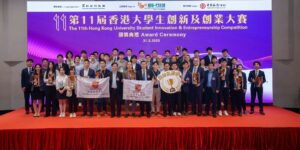
Professor Patrick Wong, CUHK’s Associate Vice-President (Research) (front row, 8th left) and Professor Benny Zee, Director of the Office of Research and Knowledge Transfer Services (front row, 9th left), with CUHK professors and CUHK award recipients.
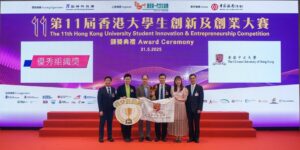
CUHK receives the Outstanding Organisation Award, collectively winning 22 awards in the competition.
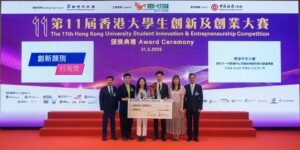
Professor Huang Chaoran (3rd left), supervisor from CUHK’s Department of Electronic Engineering, and her student Wang Benshan (3rd right) receive the grand prize in the Innovation category.
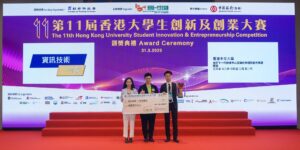
Professor Huang Chaoran (1st left), supervisor from CUHK’s Department of Electronic Engineering, and her student Wang Benshan (1st right) receive the first prize (Information Technology).
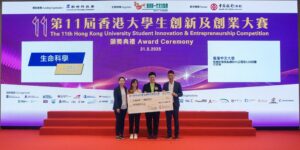
Professor Leung Kam-tong (1st right), supervisor from CUHK’s Department of Paediatrics, Dr Kathy Yuen Yee-chan (1st left), Scientific Officer, Department of Paediatrics and student Ng Wing-hei (2nd left) receive the first prize (Life Sciences).


